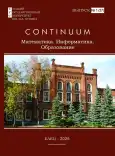FUTURE ENGINEERS COMPUTATIONAL THINKING DEVELOPMENT IN THE UNIVERSITY MATHEMATICS COURSE
- Authors: Kulikova I.V.1
-
Affiliations:
- Ural State University of Railway Transport
- Issue: No 1 (2025)
- Pages: 55-65
- Section: Theories, models and technologies of teaching mathematics and computer science in the system of vocational education
- URL: https://bakhtiniada.ru/2500-1957/article/view/304942
- DOI: https://doi.org/10.24888/2500-1957-2025-1-55-65
- ID: 304942
Cite item
Full Text
Abstract
The paper considers the problem of using computer mathematics systems in solving mathematical problems by students studying in specialties and training areas in the field of engineering and technology of land transport. The results of a content analysis of the concept of computational thinking of students of various specialties and fields of study in the process of their education in general scientific and special disciplines are presented. In the context of the problem under study, computational thinking is considered as the process of programming an algorithm for solving a problem using computer mathematics systems. When studying a university mathematics course, it is proposed to use special didactic tasks (complex computer-mathematical ones), the implementation of which provides for the mandatory use of the Mathcad computer mathematics system. The formulation of such tasks is based on the modification of the content of standard mathematical problems with the addition of the mandatory use of the Mathcad computer mathematics system to find quantitative values of the desired quantities. The article presents tasks for solving a system of linear algebraic equations (four equations and four unknowns) with multi-valued non-integer values of free terms and coefficients before the unknowns, constructing a graph of the surface of a function of two variables in a three-dimensional rectangular coordinate system, which has extremum points and stationary points, and simulating a random event to calculate its relative frequency. The implementation of the proposed complex computer-mathematical tasks determines the need to go through such stages as the perception of the learning task, the definition of a mathematical model, the construction of an algorithm for solving the problem, programming computational actions, and analyzing the results obtained. These stages create favorable conditions for the activation of students' cognitive activity and the development of their computational thinking.
About the authors
I. V. Kulikova
Ural State University of Railway Transport
Author for correspondence.
Email: ivkulikova@usurt.ru
senior lecturer Ekaterinburg
References
- Altuhova, S. O., Kononova, Z. A. (2021). Development of computational thinking on the basis of solution algorithms drafting. Mir nauki, kul'tury, obrazovanija, 5(90), 60-62. doi: 10.24412/1991-5497-2021-590-60-62. (In Russ., abstract in Eng.)
- Baranov, A. V. (2019). The didactic potential of physics learning tasks in forming the it-students’ computational thinking. Pedagogical rewiew, 1(23), 144-150. doi: 10.23951/2307-6127-2019-1-144-150. (In Russ., abstract in Eng.)
- Belman, S. A., Platonova, S. V. (2024). Organization of research activities: from the first steps to mathematical modeling tasks. «CONTINUUM. Maths. Informatics. Education» 3(35). 8-17. URL: https://continuum-journal.ru/media/docs/articles/2024/3/01.pdf (accessed date 24.02.2025) (In Russ., abstract in Eng.)
- Voskobojnikov, Ju. E., Zadorozhnyj, A. F. (2023). Osnovy vychislenij i programmirovanija v pakete MathCAD PRIME. Lan'. URL: https://e.lanbook.com/book/327599 (accessed date 24.02.2025) (In Russ.)
- Gejn, A. G., Kulikova, I. V. (2024). Computer mathematics and university students computational thinking development. Pedagogical Informatics, 2, 151-159 (In Russ., abstract in Eng.)
- D'jakonov, V. P. (2015). Tendencii razvitija komp'juternoj matematiki. Sistemy komp'juternoj matematiki i ih prilozhenija 16, 8-13 (In Russ.)
- Klunnikova, M. M., Pushkareva, T. P. (2017). Metody i sredstva razvitija vychislitel'nogo myshlenija pri obuchenii discipline "Chislennye metody". Sovremennoe obrazovanie, 2, 95-101.
- Kulikova, O. V., Kulikova, I. V. (2024). Complex tasks in teaching mathematics to students of technical specialties at a transport university. Tomsk State Pedagogical University Bulletin, 5(235), 157-166 doi: 10.23951/1609-624X-2024-5-157-166. (In Russ., abstract in Eng.)
- Lebo, I. G., Lebo, A. I., Rozanova, S. A. (2024). Methods of mathematical modeling of physical processes in the implementation of research projects by students of technical universities «CONTINUUM. Maths. Informatics. Education», 3(35), 46-59. URL: https://continuum-journal.ru/media/docs/articles/2024/3/04.pdf (accessed date 24.02.2025) (In Russ., abstract in Eng.)
- Papert, S. (1981). Mindstorms: Children, Computers, and Powerful Ideas. New York: Basic Books. (Translated from English)
- Khenner, E. K. (2016). Computational thinking. Education and science, 2, 18-33 doi: 10.17853/1994-5639-2016-2-18-33 (In Russ., abstract in Eng.)
- Khenner, E. K. (2024). Computational thinking in the context of higher education: analytical review. Education and science, 2, 35-59. doi: 10.17853/1994-5639-2024-2-35-59. (In Russ., abstract in Eng.)
- Chigirinskaya, N. V., Grigoreva, O. E., Bochkin, A. M., Andreeva, M. I. (2023). Methodological and methodical foundations for the development of computational intellection of a future engineer. Sovremennye naukoemkie tehnologii, 2, 205-211. doi: 10.17513/snt.39546. (In Russ., abstract in Eng.)
- Shchedrina, E. V., Ivashova, O. N., Paliivets, M. S. Development of computational thinking in future engineers when working with a network professionally-oriented course. Koncept, 2, 78-97 (In Russ., abstract in Eng.)
- Tedre, M., Denning, P. J. (2016). The Long Quest for Computational Thinking. Proceedings of the 16th Koli Calling Conference on Computing Education Research, November 24-27, Koli, Finland: pp. 120-129.
- Wing, J. (2011). Research Notebook: Computational Thinking - What and Why? The Link. The magazine of the Carnegie Mellon University School of Computer Science. 2011-03-06. Retrieved from: http://www.cs.cmu.edu/link/research-notebook-computational-thinking-what-and-why (accessed date 24 февраля 2025 г.)
- Wing, J. M. (2006). Computational thinking. Communications of the ACM, 3(49), 33-35. doi: 10.1145/1118178.1118215
Supplementary files







